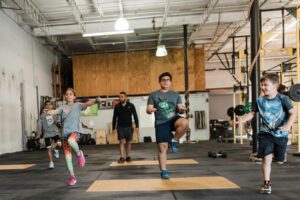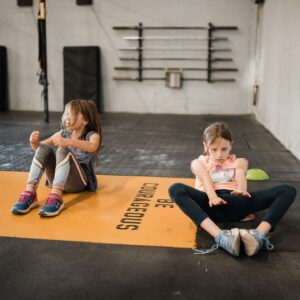In today’s fast-paced world, where screens often replace playgrounds, and sugary snacks are more appealing than fruits and veggies, it’s crucial to instill healthy habits in our children from a young age. As a fitness trainer specializing in working with kids aged 5-12, I’ve witnessed firsthand the transformative power of regular physical activity. In this blog post, I’ll explore the numerous benefits of working out for kids and why it’s an investment in their overall well-being.
- Physical Health
a. Strong Bones and Muscles Regular physical activity helps children develop strong bones and muscles. Weight-bearing exercises like running, jumping, and climbing stimulate bone growth, reducing the risk of osteoporosis later in life. Furthermore, muscle development supports good posture and overall physical strength.
b. Healthy Heart Engaging in cardiovascular activities like running, swimming, or cycling helps children maintain a healthy heart. Regular exercise strengthens the heart, lowers blood pressure, and reduces the risk of heart diseases.
c. Weight Management Childhood obesity is a growing concern, but exercise is an effective tool in managing weight. Physical activity burns calories and helps maintain a healthy body mass index (BMI), reducing the risk of obesity-related health issues.

- Mental Health
a. Stress Reduction Kids face stressors too, from school pressures to social challenges. Exercise releases endorphins, the body’s natural mood enhancers, which help reduce stress and promote a positive outlook on life.
b. Improved Focus and Concentration Physical activity enhances cognitive function. Regular workouts have been shown to improve attention span, memory, and problem-solving skills, making it easier for kids to excel academically.
c. Boosted Self-Esteem Achieving fitness goals, whether it’s running a little faster or lifting a little heavier, boosts self-esteem and confidence. It teaches kids that they can overcome challenges through determination and hard work.
- Social Skills
a. Teamwork Group sports and fitness classes foster teamwork, cooperation, and sportsmanship. Kids learn to work together, share, and support each other, valuable skills for both childhood and adulthood.
b. Friendship Building Exercise provides a natural setting for kids to make friends. It breaks the ice and provides common ground for social interaction, reducing feelings of isolation and loneliness.
c. Communication Whether it’s following instructions from a coach or expressing themselves on the field, physical activities improve communication skills. Kids learn to listen, articulate their thoughts, and resolve conflicts.

- Healthy Habits for Life
One of the most significant benefits of introducing kids to exercise is instilling lifelong healthy habits. When kids grow up understanding the importance of physical activity, they’re more likely to continue leading active lives as adults. This helps prevent many chronic health conditions, such as diabetes and heart disease.
- Enhanced Motor Skills
Physical activity plays a critical role in the development of fine and gross motor skills in children. From learning to balance on one foot to improving hand-eye coordination, exercise promotes better control of their bodies.
- Screen Time Reduction
With the prevalence of screens in today’s world, it’s crucial to counteract excessive screen time with physical activity. Regular exercise encourages kids to unplug and spend more time outdoors, engaging in active play instead of passive entertainment.
Conclusion
As a fitness trainer for kids aged 5-12, I’ve seen countless young lives transformed by the power of exercise. Physical activity isn’t just about building strong bodies; it’s about nurturing healthy minds and nurturing vital life skills. By introducing children to fitness early on, we’re giving them the tools they need to lead happy, healthy, and fulfilling lives. So, let’s get our kids moving and watch them grow into strong, confident, and resilient individuals. The benefits of working out for kids are indeed immeasurable, shaping their futures in the most positive way possible.
